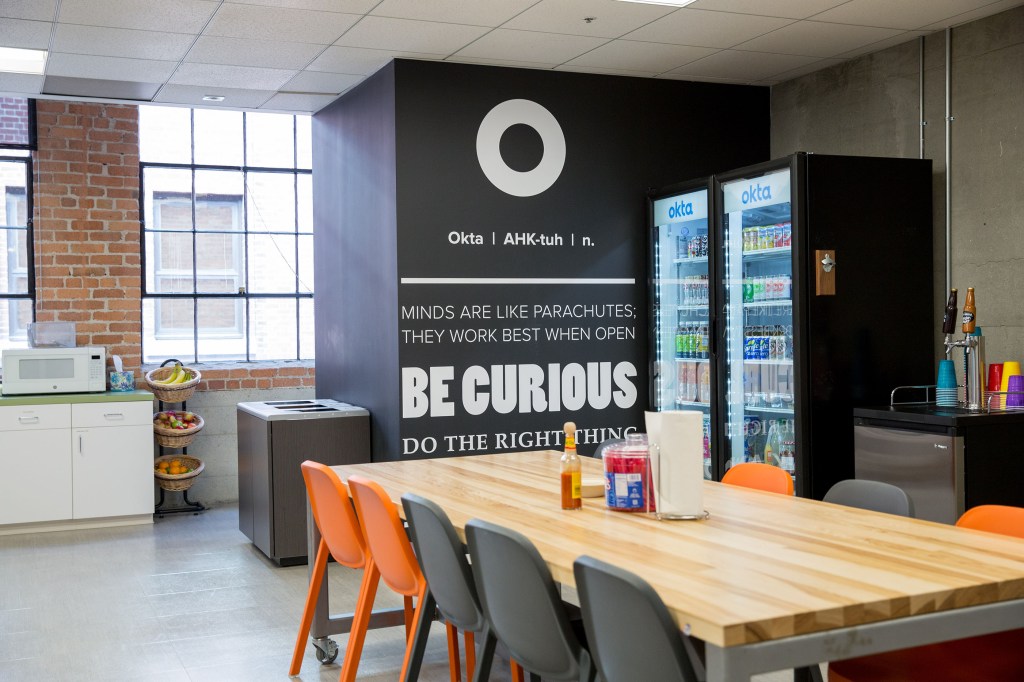It looks like Snap’s (at least perceived) successful IPO has officially opened the window: Following Yext officially filing for an IPO this afternoon, identity management software company Okta just dropped its official filing for an IPO.
After much hand-wringing about whether or not 2017 would avoid last year’s fate of an IPO drought, we’ve seen three IPOs all within the span of about a month and a half. Okta, like Yext, is looking to raise up to $100 million as of the Securities and Exchange Commission filing today. With Cisco snapping up AppDynamics right before it went public, investors and companies were waiting to see if there was actually some appetite for IPOs — which, apparently, there is plenty.
At first blush, Okta’s financials show wide losses (around $22 million in the third quarter of 2016), but the burn isn’t accelerating. In the 2015 third quarter, Okta lost around $21.5 million. Its revenue nearly doubled in the October quarter last year, up to $38 million. Of course, this isn’t like an insane jump in revenue like a consumer IPO like Snap, but enterprise companies tend to show a more methodical growth rate. That tends to make them more reliable investments if the thesis remains sound.
This also looks like another big potential win for Sequoia Capital, which owns a whopping 21.2 percent of the company. Andreessen-Horowitz, Khosla Ventures and Greylock Partners also have major ownership stakes in the company. It’s not at the scale of a massive IPO like Snap, but it’s the sum of all these smaller enterprise IPOs that can help define the success stories for various firms.
Okta specializes in identity management software, though it’s been expanding into security, mobile device management and two-factor authentication. This is important for larger corporations that start to have sprawling sets of applications across multiple divisions. Corporations need to ensure that all these services don’t serve as entry points for potential breaches and make it easier for employees to manage their access to a wide array of tools that they might need to do their jobs. One example would be reducing the number of password resets, which can be a huge headache for IT departments.
As for risk factors, there are two big ones that stand out here: reliance on Amazon’s web services (like a whole host of other services), and a reliance on open source technology. The Amazon risk factor’s an easy one to unpack — a minor screwup can end up bringing a whole segment of the internet down. Corporations don’t quite have the luxury of having their services just drop off the grid and not operating for a while.
“A prolonged AWS service disruption affecting our platform for any of the foregoing reasons could damage our reputation with current and potential customers, expose us to liability, cause us to lose customers or otherwise harm our business,” the company said in its S-1 filing. “We may also incur significant costs for using alternative equipment or taking other actions in preparation for, or in reaction to, events that damage the AWS services we use.”
On the open source front, the company explains that it might be on the hook for litigation if the ownership of the software that it’s using in its products is questioned. This is just one of the many risks that a company that takes on open source technology — which is increasingly common — acquires.
“However, the terms of many open source licenses have not been interpreted by U.S. courts, and there is a risk that these licenses could be construed in a way that could impose unanticipated conditions or restrictions on our ability to commercialize our products,” the company said. “As a result, we could be subject to lawsuits by parties claiming ownership of what we believe to be open source software. Litigation could be costly for us to defend, have a negative effect on our results of operations and financial condition or require us to devote additional research and development resources to change our products.”
Snap’s debut as a publicly traded company started with a bang, with the stock price immediately spiking 40 percent from its IPO price on its first day. Since then, reality has set in and Snap’s seen a string of declines that’s cut its valuation to around $24.5 billion (from about $30 billion on day one). This was pretty much to be expected, but Snap is still hovering well above its IPO price, so it looks like Wall Street is feeling pretty good about IPOs this year.
The company has been rumored to be an IPO candidate for a while. From what we were hearing, we’d expected this one to happen last year, but 2016 was just not a good year for IPOs. In September 2015, Okta raised $75 million at a nearly $1.2 billion valuation, and was expected to go public in 12-18 months.































Comment